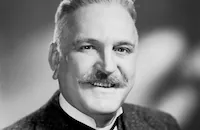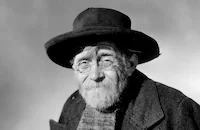Secrets of the French Police

Brief Synopsis
Cast & Crew
Edward Sutherland
Gwili Andre
Gregory Ratoff
Frank Morgan
John Warburton
Rochelle Hudson
Film Details
Technical Specs

Synopsis
Soon after the murder of Danton, an agent of the French secret police, beautiful Parisian flower vendor Eugenie Dorain is kidnapped by minions of General Hans Moloff, a half-Russian, half-Chinese madman. Then, after determining that only Danton and Anton, Eugenie's foster father, were informed of the identity of Eugenie's Russian parents, Moloff murders Anton. When police detective François St. Cyr later discovers Anton's body, he suspects Eugenie's boyfriend, Leon Renault, a notorious pickpocket, but on a hunch, decides to use him as a guide into the Parisian underworld. While St. Cyr has his undercover agents comb the city for Eugenie, Moloff cables the Grand Duke Maxim, the brother of the slain Czar Nicholas II, that he has located Princess Anastasia, Nicholas' only surviving child, then hypnotizes Eugenie and brainwashes her to believe that she is the princess. Soon after, St. Cyr hears a report that the supposed princess bears a resemblance to Eugenie and dispatches Leon to Moloff's chateau to investigate. As Moloff tries to convince Maxim that the entranced Eugenie is Anastasia, Leon breaks into the heavily guarded chateau and stumbles into Moloff's basement, which is filled with sinister looking scientific tools. Although he is chased off before finding Eugenie, Leon conveys his suspicions to St. Cyr, who is then called to investigate an automobile accident near the chateau. At the accident site, St. Cyr finds Maxim's body and a document signed by Maxim declaring Moloff's Anastasia as Nicholas II's rightful heir. After St. Cyr's men determine that Maxim's death was caused by an elaborately produced optical illusion, St. Cyr tries to question Eugenie but is turned away from the chateau. As Moloff prepares to flee with Eugenie, Leon returns to the chateau to rescue her but is caught by the general. Seconds before her death at the hands of Moloff, St. Cyr and the police break into the chateau and force Moloff to kill himself using his own instruments of death.

Director
Edward Sutherland
Cast

Gwili Andre

Gregory Ratoff

Frank Morgan
John Warburton

Rochelle Hudson

Christian Rub
Murray Kinnell
Arnold Korff
Kendall Lee
Lucien Prival
Guido Trento
Julia Swayne Gordon
Crew
Joe Biroc
Carroll Clark
Eddie Croninworth
James Daly
George D. Ellis
Alfred Gilks
Samuel Ornitz
Arthur Roberts
David O. Selznick
Max Steiner
Robert Tasker
Jo Van Ronkel
Harold Wellman
Harry Wild

Videos
Movie Clip



Film Details
Technical Specs

Articles
Secrets of the French Police -
By Richard Harland Smith

Secrets of the French Police -
Quotes
Trivia
Notes
The working title of this film was Mysteries of the French Secret Police. An early pre-production Film Daily news item announced that detective fiction author Rufus King was writing the screenplay for the film. King's contribution to the final film has not been determined. According to RKO inter-department memos, after investigating the legal ramifications of portraying actual people in the film, including the late French detective Bertillon, studio representatives discovered that writer H. Ashton-Wolfe, who was reported to be a former assistant investigator in the Lyons police department, was a fraud and was wanted on swindling charges in France and England at the time of this production. Ashton-Wolfe's character was subsequently dropped from the script and replaced with "St. Cyr." Studio executives also worried about possible lawsuits resulting from their portrayal of Princess Anastasia, whose existence was being contested by a woman in Europe, but deemed it unlikely that any legal action against RKO would be taken.














